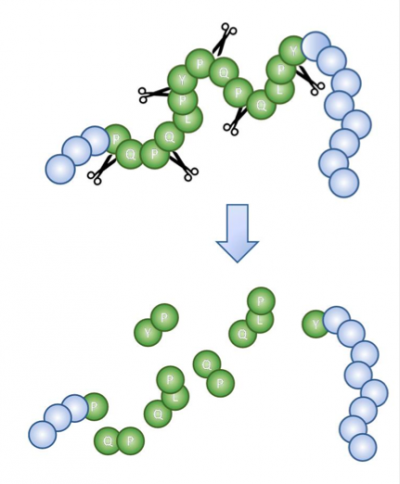DSM explores how the gluten-intolerant could have their cake and eat it

Speaking to FoodNavigator-USA.com at the launch of DSM’s multi-million-dollar new innovation center in Parsippany, New Jersey last week, Gregory Kesel, president of DSM Food Specialties, North America, said: “Gluten-free is a very hot consumer topic at the moment, and we are doing some work with enzymes in gluten-free bakery areas to improve the eating quality of products in this market.
“But there is also one product in our innovation pipeline: an enzyme that could help people digest gluten.”
Product would not target diagnosed celiacs
But this was not a ‘get out of jail free’ card giving diagnosed celiacs carte-blanche to wolf down pizza and bread, he said.“We’re not talking about a product for celiacs. They should just avoid gluten altogether.
“But there is also a group of people with an intolerance to gluten, and this would be for them. But it’s at the very early stages of development – I don’t want to give the impression we’re about to launch something here. It’s sitting in our R&D labs.”
He added: “We’re still doing some trials to see if it works. At this stage we’re not sure it is something that would be added to food; it’s more a case of a supplement you’d take before meals.”
Gluten intolerance
While about one percent of the population is believed to have celiac disease – an auto-immune disease that damages the lining of the gut and inhibits the absorption of vital nutrients – an indeterminate number of people is believed to experience gluten intolerance, which is not thought to be immune-mediated.
According to the American Celiac Disease Alliance, gastrointestinal symptoms associated with gluten intolerance may include "gassiness, abdominal pain, abdominal distension, and diarrhea. These symptoms are usually transient, and are thought not to cause permanent damage”.
It adds: “While celiac disease, wheat allergy, and gluten-intolerance may be treated with similar diets, they are not the same conditions. Due to the genetic component, and risk of nutritional deficiencies, other autoimmune diseases, and gastrointestinal cancers, it is very important for a person to be properly diagnosed.”
Aspergillus niger
In 2006, in-vitro investigations at Leiden University in The Netherlands showed that an enzyme AN-PEP (prolyl endopeptidase) derived from the Aspergillus niger fungus and supplied by DSM might be able to break down gluten in the stomach before it reached the small intestine.
The authors of the study, which was published in the American Journal of Physiology - Gastrointestinal and Liver Physiology, noted that AN-PEP "efficiently degrades gluten in vitro under the conditions similar to the ones present in the gastrointestinal tract" but added: "Because no animal model for celiac disease is available, an in vivo evaluation of the efficacy of AN-PEP will ultimately have to be carried out in patients."
Were it proven to be effective in human clinical studies, "oral supplementation with postproline cutting enzymes could be a valuable method to eradicate the proline-rich T cell stimulatory epitopes from gluten proteins", they concluded.
Click here to see the coverage in our sister title NutraIngredients.com.















